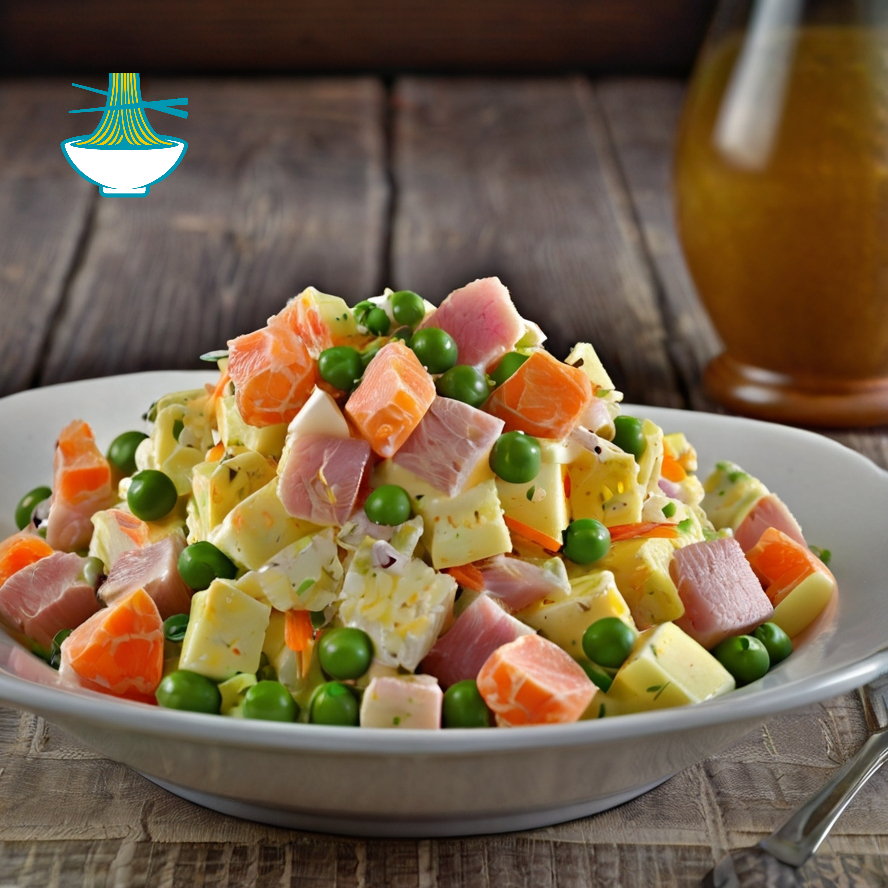The Russian Olivier Salad is a beloved classic featuring diced boiled potatoes, carrots, peas, eggs, pickles, and often ham or chicken, all bound together with creamy mayonnaise. Originating in the 19th century, it was invented by French chef Lucien Olivier in Moscow. Initially, a closely guarded secret, its popularity spread rapidly across Russia and beyond, becoming a staple at festive gatherings and holiday tables. Today, it remains a cherished dish, celebrated for its rich flavors and colorful presentation.
Ingredients:
- 3 large potatoes
- 2 carrots
- 1 cup of frozen peas
- 3 hard-boiled eggs
- 3 pickles
- 200g of cooked ham or chicken (optional)
- 1 cup of mayonnaise
Method:
- Peel and dice the potatoes and carrots. Boil them until tender, then drain and let cool.
- Cook the frozen peas according to package instructions, then drain and let cool.
- Chop the hard-boiled eggs, pickles, and ham or chicken (if using) into small pieces.
- In a large bowl, combine the cooked potatoes, carrots, peas, chopped eggs, pickles, and ham or chicken.
- Add mayonnaise and gently toss until all ingredients are coated.
- Refrigerate for at least an hour before serving to allow flavors to meld.
Enjoy your delicious Russian Olivier Salad!
Nutrition Value:
3 large potatoes:
- Calories: Approximately 300 kcal
- Carbohydrates: Around 70 grams
- Protein: Roughly 8 grams
- Fat: Negligible
- Sodium: Minimal
- Cholesterol: None
- Vitamins: High in vitamin C, B6, and potassium
- Minerals: Rich in potassium, magnesium, and phosphorus
Benefits: Potatoes provide energy from carbohydrates and are a good source of dietary fiber, promoting digestive health. They also contain vitamin C, aiding in immune function and collagen synthesis.
2 carrots:
- Calories: About 50 kcal
- Carbohydrates: Around 12 grams
- Protein: Roughly 1 gram
- Fat: Negligible
- Sodium: Minimal
- Cholesterol: None
- Vitamins: High in vitamin A, C, and K
- Minerals: Rich in potassium, biotin, and manganese
Benefits: Carrots are known for their high beta-carotene content, which converts to vitamin A in the body, essential for vision health. They also provide antioxidants and fiber, supporting heart health and aiding digestion.
1 cup of frozen peas:
- Calories: Approximately 60 kcal
- Carbohydrates: Around 11 grams
- Protein: Roughly 4 grams
- Fat: Minimal
- Sodium: Minimal
- Cholesterol: None
- Vitamins: High in vitamin K, C, and folate
- Minerals: Rich in manganese, iron, and fiber
Benefits: Peas offer plant-based protein, promoting muscle health and satiety. They are also high in fiber, aiding digestion, and contain vitamin K, essential for blood clotting and bone health.
3 hard-boiled eggs:
- Calories: Approximately 240 kcal
- Carbohydrates: Around 1.5 grams
- Protein: Roughly 18 grams
- Fat: Around 18 grams
- Sodium: Minimal
- Cholesterol: High (Around 600 mg per egg)
- Vitamins: High in vitamin B12, D, and riboflavin
- Minerals: Rich in selenium, phosphorus, and choline
Benefits: Eggs are a complete protein source, containing all essential amino acids. They also provide essential nutrients like vitamin D, crucial for bone health, and choline, important for brain function and development.
3 pickles:
- Calories: About 15 kcal per pickle
- Carbohydrates: Around 4 grams per pickle
- Protein: Negligible
- Fat: Negligible
- Sodium: High (Around 800 mg per pickle)
- Cholesterol: None
- Vitamins: Low
- Minerals: Low
Benefits: Pickles are low in calories and fat but high in sodium. They add flavor to dishes but should be consumed in moderation, especially for those watching their sodium intake.
200g of cooked ham or chicken (optional):
- Calories: Depends on the type and cut of meat
- Carbohydrates: Varies
- Protein: Varies (Around 20-25 grams per 100 grams)
- Fat: Varies (Depends on lean/fat content)
- Sodium: Varies
- Cholesterol: Varies
- Vitamins: Contains B vitamins, particularly B6 and B12
- Minerals: Contains iron, zinc, and phosphorus
Benefits: Provides high-quality protein, essential for muscle repair and growth. Depending on the type of meat and its preparation, it can offer various vitamins and minerals crucial for overall health.
1 cup of mayonnaise:
- Calories: Approximately 700-800 kcal
- Carbohydrates: Around 2 grams
- Protein: Negligible
- Fat: Around 80 grams
- Sodium: Varies (Around 600-700 mg per tablespoon)
- Cholesterol: High (Around 50 mg per tablespoon)
- Vitamins: Low
- Minerals: Low
Benefits: Mayonnaise is high in calories and fat, primarily from oil and eggs. While it adds creaminess and flavor to dishes, it should be consumed in moderation due to its high calorie and fat content.
These nutritional values are approximate and may vary depending on factors such as portion size, cooking methods, and specific brands/products used. It's always a good idea to consult with a healthcare professional or nutritionist for personalized dietary advice.


Comments